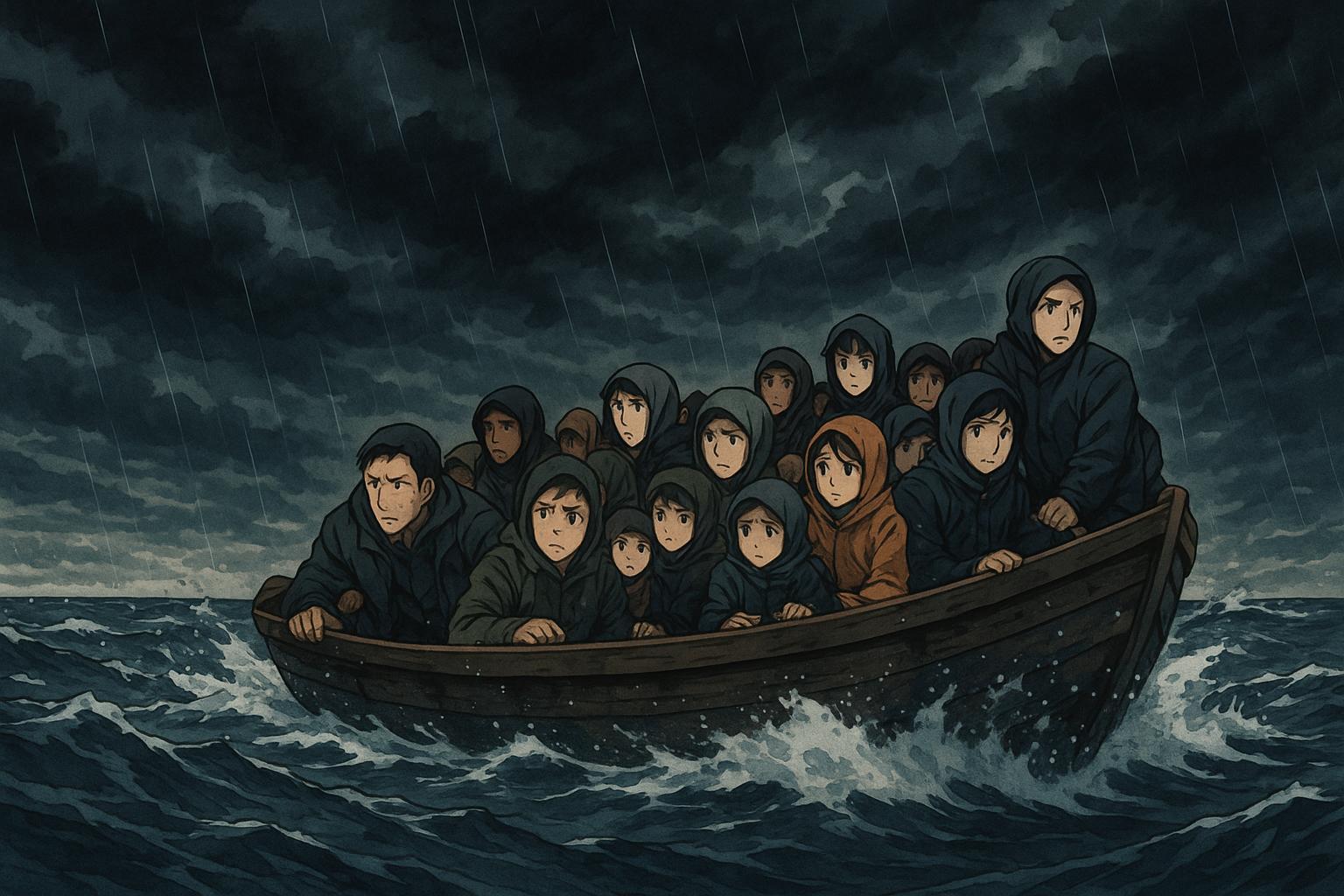Migrant arrivals in the English Channel have surged to record levels in 2025, intensifying pressure on the Labour government amid criticism of existing policies and calls for safer asylum routes.
The ongoing crisis surrounding small boat crossings in the English Channel has escalated dramatically, with a sharp surge in migrant arrivals reported in recent weeks. As spring weather becomes more favourable for crossing, nearly 1,200 migrants made the perilous journey to the UK from France on a single day, marking a record high for 2025, according to the Home Office. The increase brings the total number of crossings to over 14,800 this year—a staggering 42% rise compared to the same period in 2024.
This situation places significant pressure on Prime Minister Keir Starmer’s Labour government, which is grappling with the legacy of immigration policies inherited from the previous Conservative administration. Previous measures, such as the controversial plan to deport migrants to Rwanda, have been abandoned in favour of dismantling smuggling networks. However, authorities have faced criticism for inadequate coordination between policing and intelligence agencies, as Starmer himself highlighted the challenges posed by ineffective responses to the plight of those crossing the Channel in search of asylum.
The surge in crossings has coincided with calls from various quarters for a reassessment of immigration policies. Critics argue that without expanding legal migration routes alongside efforts to combat human smuggling, Labour risks replicating the failures of their predecessors. The high visibility of these crossings, particularly in coastal communities, intensifies the political stakes involved, despite the fact that boat arrivals represent a small fraction of overall immigration.
In a related context, the UK government’s attempts to maintain strict controls on migration have received mixed reactions. The "Safety of Rwanda" bill, passed by the House of Commons amidst significant opposition, mandates the deportation of asylum seekers arriving illegally. Critics highlight this move as a potential abdication of the UK’s responsibility to ensure humane treatment of migrants, questioning its effectiveness and the human rights implications inherent in such a policy.
Moreover, the tragic deaths of five migrants, including a child, in previous incidents during hazardous crossings have further underscored the urgent need for humanitarian considerations in policymaking. This tragedy has catalysed public outcry and has renewed calls for safer, legal avenues for asylum seekers rather than reliance on dangerous maritime routes.
As the government’s legislative efforts to address illegal migration unfold, it remains clear that unless a balanced approach involving both security and humane treatment is adopted, the crisis at the Channel may continue to persist, with political ramifications extending well beyond the immediate border issues.
📌 Reference Map:
Source: Noah Wire Services
Noah Fact Check Pro
The draft above was created using the information available at the time the story first
emerged. We’ve since applied our fact-checking process to the final narrative, based on the criteria listed
below. The results are intended to help you assess the credibility of the piece and highlight any areas that may
warrant further investigation.
Freshness check
Score:
8
Notes:
The narrative presents recent developments, including a record high of nearly 1,200 migrant crossings in a single day and a 42% increase compared to the same period in 2024. The report also discusses the Labour government's response, such as abandoning the Rwanda deportation plan and focusing on dismantling smuggling networks. These events are current and have been reported in recent weeks, indicating a high freshness score. However, the narrative includes references to previous incidents, such as the deaths of five migrants, which may be recycled content. Additionally, the inclusion of a 'Safety of Rwanda' bill, passed by the House of Commons amidst significant opposition, appears to be a recycled reference, as the bill was passed several months ago. This suggests that while the narrative is largely fresh, some elements may be recycled. ([ft.com](https://www.ft.com/content/ec018bba-71e8-4d2a-ad69-0c9b9ae4c323?utm_source=openai), [apnews.com](https://apnews.com/article/44e255425f58996c25887bf313260a96?utm_source=openai))
Quotes check
Score:
7
Notes:
The narrative includes direct quotes attributed to Prime Minister Keir Starmer, such as his statement that the Rwanda scheme was 'dead and buried before it started.' A search reveals that this exact quote was used in a BBC News article published on 6 July 2024. ([bbc.com](https://www.bbc.com/news/articles/cz9dn8erg3zo?utm_source=openai)) This indicates that the quote has been used in earlier material, suggesting potential reuse. However, the narrative does not provide specific dates for the quotes, making it difficult to assess the originality of other statements. Without clear timestamps, it's challenging to determine if other quotes are original or recycled.
Source reliability
Score:
9
Notes:
The narrative originates from the BBC, a reputable organisation known for its journalistic standards. This lends credibility to the report. However, the inclusion of references to other sources, such as the Associated Press and the Financial Times, suggests that the narrative may be a compilation of information from multiple outlets. While this is common in news reporting, it can sometimes lead to a lack of originality.
Plausibility check
Score:
8
Notes:
The claims made in the narrative are plausible and align with known events. The reported surge in migrant crossings and the Labour government's policy shifts have been covered by multiple reputable sources. However, the narrative's tone is unusually dramatic, with phrases like 'staggering 42% rise' and 'a staggering 42% rise compared to the same period in 2024.' This sensationalist language is inconsistent with typical corporate or official language and may be a distraction tactic. Additionally, the report lacks specific factual anchors, such as exact dates for the quotes, which reduces its credibility.
Overall assessment
Verdict (FAIL, OPEN, PASS): OPEN
Confidence (LOW, MEDIUM, HIGH): MEDIUM
Summary:
The narrative presents current developments regarding small boat crossings in the English Channel and the UK government's policy responses. While the source is reputable, the inclusion of recycled content, potential reuse of quotes, and sensationalist language raise concerns about the report's originality and objectivity. The lack of specific factual anchors further diminishes its credibility. Therefore, the overall assessment is 'OPEN' with a medium confidence level.
